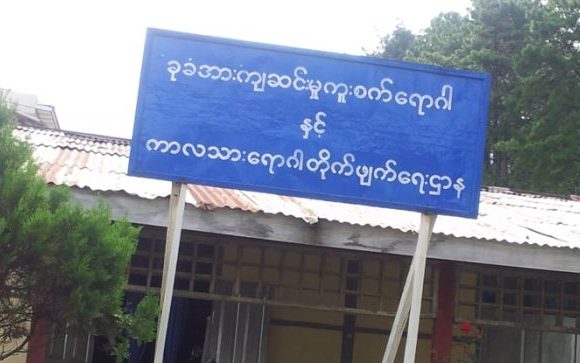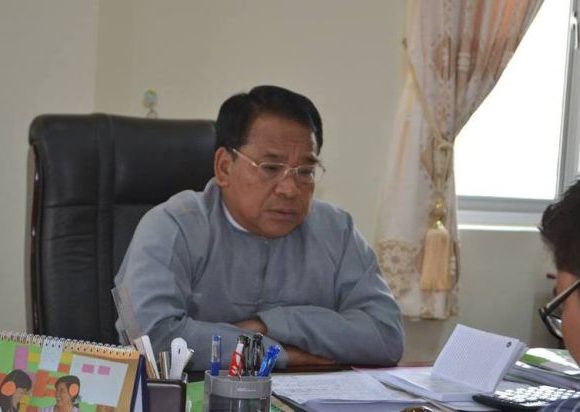Interview With General Secretary Of Ethnic Nationalities Council Duwa Mahkaw Hkun Hsa
25 October, 2008[CG Note: This interview was originally conducted in Burmese by Thangpi and translated into English by Van Biak Thang]
The 5th Ethnic Nationalities Council (ENC) Conference was held on the Thai-Burma border on 26-28 August 2008. With a total of 55 participants and representatives from each State of Burma, the ENC leaders for the next term were unanimously voted by ballot in a democratically held election. Duwa Mahkaw Hkun Hsa was elected General Secretary.
Duwa Mahkaw Hkun Hsa finished B.A (Law) and LL.B degrees from Rangon University in 1977 and 1978 respectively. After practicing laws from 1980 to 1983, he was arrested as an advocate until September 1991. He was actively involved in the country’s 8888 uprising. He served as General Secretary of Kachin State National Congress for Democracy (KNCD) which was formed by a group of representatives from all the ethnic groups living in the Kachin State. KNCD, which he co-founded in 1988, was banned shortly after his arrest. Winning three seats in parliament during Burma’s 1990 general election, the party has been the one and only State level political party with the national spirit, standing for the Kachin state and citizens.
He was frequently summoned and interrogated by the SPDC authorities based in Myitkyina, the capital of Kachin State after the 1990 general election. He was accused of ‘assaulting’ the government, charged under Section 5J of the 1950 Emergency Provisional Act and sentenced with hard labour to 10 years. After his release from prison, he left his homeland on 5 February 2002 for Thailand in order to continue his political movements.
His current positions include:
• Chairperson, Kachin State National Congress for Democracy- Liberated Area (KNCD – LA)
• Vice Chairperson, United Nationalities League for Democracy – Liberated Area (UNLD-LA)
• General Secretary, Kachin National Council, Kachin National Organization (KNO) 2
• General Secretary, Ethnic Nationalities Council (Union of Burma)
• Secretary of Constitutional Affairs Department, Ethnic Nationalities Council (Union of Burma)
• Drafter, Federal Constitution Drafting and Coordinating Committee (FCDCC)
• Chairperson, Kachin State Constitutional Drafting Committee (KCDC)
Chinland Guardian: What are the main points of the statement made by the 5th ENC Conference?
Hkun Hsa: Firstly, by pondering the problems in our country, we can see that they are only political problems. Therefore, we call for solving these problems by political means, striving to facilitate a non-violent and peaceful democratic transition and most importantly, finding a solution by having a dialogue between SPDC, and NLD led by Aung San Suu Kyi, democratic parties and ethnic nationalities.
Secondly, in order to solve the problems, as mentioned above, peacefully, we call for a multi-party talk where the UN and neighbouring countries are involved.
Finally, the peoples of Burma, willingly or unwillingly, will have to vote for the 2010 elections because of the threatening pressure by SPDC. The ENC calls on the governments worldwide, international organisations and communities to support in a way that the people of Burma can express their true will and voices without intimidation and fear, building the Union of Burma that guarantees democracy, human rights, self-determination and equality of the ethnic nationalities.
Chinland Guardian: Could you tell us, in brief, your views on Burma’s current political situation?
Hkun Hsa: The actual problem of the Union of Burma is not between the Burman and the ethnic nationalities. It is actually between some of the political extremists and the military junta. Just like a saying: ‘A constitution is the mirror of a country’, if we look at the SPDC’s constitution, we can see clearly not only the lack of equality and rights of the peoples but also its propaganda towards extermination of cultures, literatures, religions and identities of the ethnic nationalities. I see that we all need to work hard
– so that the peoples of Burma understand the consequences and sufferings we can face if we lose our identity, land, language and literature
– so that the peoples of Burma join hand-in-hand in the fight against the plight of ethnic nationalities
– so that the international communities know the truth about what happens in Burma
Chinland Guardian: What motivated you to carry on the movements?
Hkun Hsa: We need to work together:
– so that we, the ethnic nationalities, become active politically more than the present time
– so that those who are already active can get out from the grip of fear and intimidation
– so that we gain our rights and self-determination by ourselves
We are to build unity in each ethnic nationality, unity among all the ethnic nationalities, and then unity between the ethnic nationalities and the democratic forces.
Chinland Guardian: We have heard that some democratic forces and political researches said that the ‘Tripartite dialogue’ is not successful and left behind. What do you say?
Hkun Hsa: Until the enemy can make a situation where they can offer and say ‘let’s talk’, the Tripartite Dialogue will not work. I would like to say it is a bit early to say that it has been left behind.
Chinland Guardian: Why do you think the Panglong spirit is important? What are the challenges ahead?
Hkun Hsa: Only because of the morale of our national leaders who initially struggled to build the Union of Burma could today’s Union of Burma where all the ethnic nationalities with different races, languages, literature, traditions and customs live in unity and harmony exists. It is only because of their goodwill and kind-heartedness.
Honesty, goodwill and kind-heartedness are the words they said. These could be seen by looking at their actions and voices. The Panglong Agreement came into existence only because of the so-called actions, speeches and tones. Based upon the Panglong agreement, they strived to build the Union of Burma with national equality and self-determination, and to gain independence together instead of pursuing a separate independent nation. That is why the Panglong Agreement is important.
The challenges are the generals and their followers who are, opposing the spirit of Panglong Agreement, building a ‘fourth Burmese Empire’ called the fourth Myanmar, and any activities of those who accept and share their views.
Chinland Guardian: How would you like to see the future of Burma?
Hkun Hsa: I would like to see the Union of Burma that ensures genuine democracy and human rights, equality and self-determination of the ethnic nationalities.
Chinland Guardian: Your message to Burma’s ethnic nationalities.
Hkun Hsa: Keep at least ‘deserved’ understanding and unflinching perseverance.






